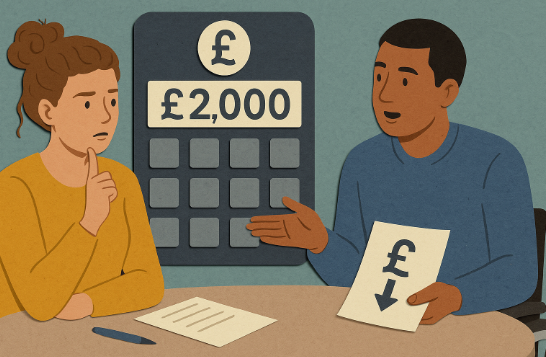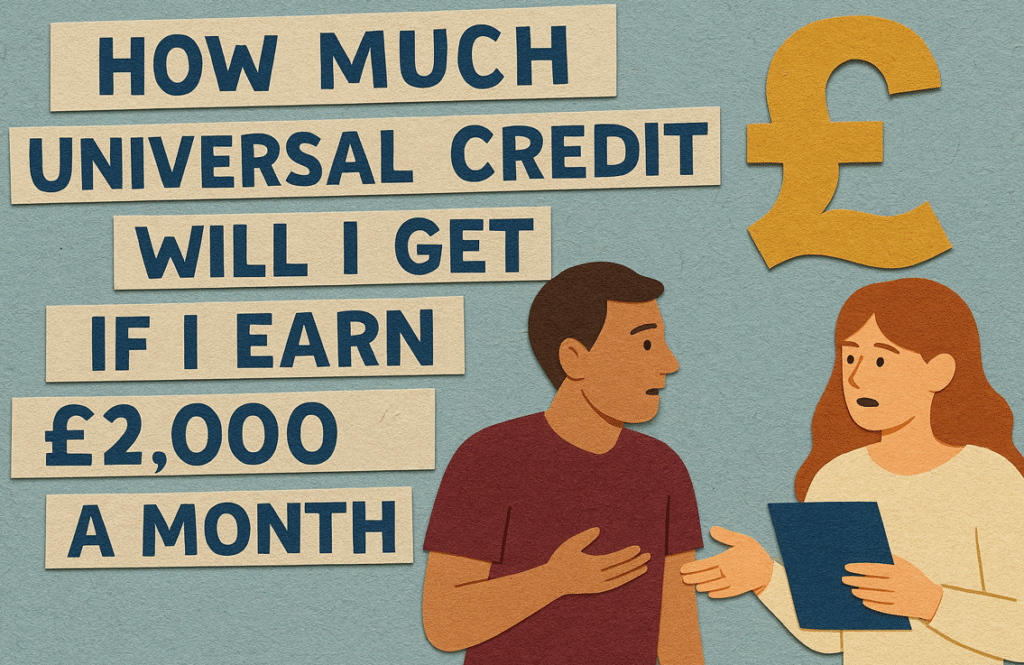Universal Credit (UC) is a monthly payment to help with your living costs. If you’re working and on a low income, it adjusts based on how much you earn. But if you earn £2,000 a month, can you still receive any UC? In this guide, we’ll explain how it works, how much you might receive, and under what conditions you could still qualify.
What is Universal Credit and how does it support working individuals?

Universal Credit is a means-tested benefit in the UK that helps individuals and households with living costs. It replaces six legacy benefits including income support, housing benefit, and tax credits. For working individuals earning £2,000 a month, the amount of Universal Credit you can receive depends on various factors like age, housing costs, and additional needs.
What is the standard Universal Credit allowance for a single person aged 25 or over?
- The standard monthly Universal Credit allowance (as of April 2025) is £400.14 for a single person aged 25 or over.
- This is the base amount before any earnings or additional elements are considered.
- This amount is set annually by the government and may increase with inflation.
- It’s the starting point for calculating your entitlement, from which deductions for earnings are made.
- If you’re eligible for additional elements like housing or childcare, those will be added to this amount.
Do I get a work allowance if I earn £2,000 a month with no children or disabilities?
- No, work allowance applies only if you have dependent children or a disability/health condition that affects your ability to work.
- Without these, your entire income above £0 is subject to the 55% taper rate.
How is Universal Credit reduced by earnings at the taper rate?
- Earnings over any work allowance (which is £0 in this case) reduce your UC by 55p for every £1 earned.
- Calculation: £2,000 x 0.55 = £1,100 reduction from your UC award.
- This means you lose more than the full amount of your standard allowance.
- Any entitlement will only arise if additional elements like housing or childcare support are included.
Will I receive any Universal Credit if I earn £2,000 per month?

If your monthly Universal Credit standard allowance is £400.14 and your earnings deduction is £1,100 (calculated at the 55% taper rate), the deduction is greater than your allowance. This means your Universal Credit is reduced to £0, and you will not receive any payment.
- Your earnings completely cancel out the standard UC allowance.
- Without any qualifying elements (e.g., rent or children), you cannot get UC at this income.
- This setup is designed to make work pay but also ensures UC is targeted at those with lower earnings.
- If your earnings were lower than £727 per month, you might qualify for some UC.
- Adding elements like housing, childcare, or disability could increase your potential entitlement even with a £2,000 income.
Can additional elements increase my Universal Credit entitlement?
Yes. You may qualify for additional elements, such as:
- Housing element: If you pay rent, you could get help depending on Local Housing Allowance (LHA) rates.
- Child element: If you have children, you can receive extra monthly amounts.
- Limited capability for work or work-related activity (LCW/LCWRA): Limited capability for work-related activity adds more if you’re unable to work due to health.
- Carer element: If you care for someone receiving disability benefits.
Without these, your entitlement remains £400.14, subject to full taper.
What is the maximum you can earn and still receive Universal Credit?
- Since there’s no work allowance in this scenario, the full £400.14 is tapered.
- Maximum income to receive any UC: £400.14 / 0.55 ≈ £727.53/month.
What if I have rent or other qualifying expenses?
If you pay rent:
- Example: If eligible for a housing element of £700/month, total maximum UC = £400.14 + £700 = £1,100.14
- Deduction remains £1,100
- Final UC = £1,100.14 – £1,100 = £0.14
- You would still receive some UC (just a few pence in this case)
If I work 20 hours a week, how much Universal Credit will I get?

Assuming £10.50/hour wage:
- Monthly earnings = 20 hours × 4 weeks × £10.50 = £840
- Taper deduction = £840 × 0.55 = £462
- UC entitlement = £400.14 – £462 = £0
However, if you have children or pay rent, your total maximum entitlement would be higher, and you might receive some UC even with this income. But, what about if you earn £1000 per month?.
How is Universal Credit calculated?
Universal Credit is calculated in the following steps:
- Start with the standard allowance and any additional elements you qualify for (e.g. housing, children, disability).
- Subtract earnings using the taper rate of 55% (after any work allowance).
- The result is the final Universal Credit payment.
Table: UC Calculation Breakdown for £2,000/month income
| Component | Amount (£/month) |
|---|---|
| Standard Allowance | 400.14 |
| Work Allowance | 0 |
| Gross Earnings | 2,000 |
| Taper Rate Deduction (55%) | 1,100 |
| Final UC Award | 0 |
Expert Insight
“Universal Credit is designed to taper gradually, ensuring that work always pays. However, without elements like housing or children, even moderate earnings can wipe out entitlement.” – Joseph Rowntree Foundation
Conclusion: How Much Universal Credit Will I Get If I Earn £2,000 a Month?
If you’re a single person aged 25 or over with no children, health conditions, or other qualifying elements, earning £2,000/month will result in £0 Universal Credit. The high taper rate ensures that your earnings reduce your entitlement entirely. However, adding elements like rent, children, or health needs could potentially change this outcome.
FAQs
Can I still get Universal Credit if I rent?
Yes, if you’re eligible for the housing element. It may increase your UC enough to offset the earnings deduction slightly.
Does savings impact my UC eligibility?
Yes. If you have over £16,000 in savings, you’re not eligible for Universal Credit.
Can Universal Credit be backdated?
Yes, up to one month in some cases, if you had good reason for delaying your claim.
Do I have to report changes in earnings monthly?
Yes. Your UC adjusts monthly based on reported earnings via PAYE.
What happens if my income drops temporarily?
If your earnings fall, your UC increases accordingly the following month, due to real-time assessment.
I’m Laura Wilson, a passionate blogger and content creator with a deep interest in business, finance, and entrepreneurship. I’ve had the opportunity to write for several premium blogs, sharing insights & practical advice for individuals & small businesses. I’m the founder and publisher of ukbusinessmag.co.uk, where I focus on creating valuable, easy-to-understand content to help UK startups & SMEs grow.



